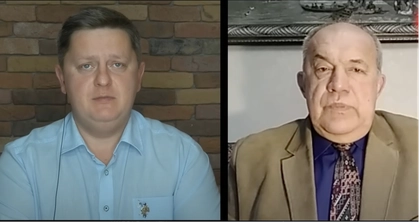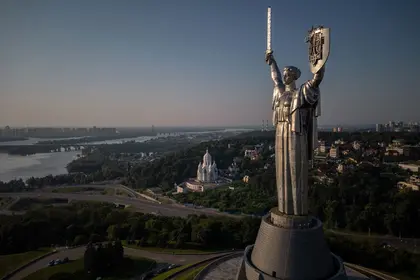The removal of the communist symbol that has adorned Europe's tallest sculpture for more than 40 years was a signal that Ukraine was moving away from the influence of the past and focusing on the present and future.
On Aug. 6, Ukraine marked its 32nd year of independence and final liberation from the totalitarianism and oppression of the past through, what some saw as a sacred act, the removal of the “hammer and sickle” emblem of the USSR from a statue.
JOIN US ON TELEGRAM
Follow our coverage of the war on the @Kyivpost_official.
Kyiv’s Batkivshchyna-Maty (The Motherland Monument), which faces east towards the Russian Federation holding a sword and shield in its hands, has now become truly the state symbol of Ukrainian independence. The emblems of Soviet communism have given way to Ukraine’s Tryzub (Trident), which to all Ukrainians embodies the idea of “Volya” (Freedom) in the present and the future.
Today, everyone can see the Soviet coat of arms as part of an installation symbolically named “reinterpretation” in the War Museum at the base of the Batkivshchyna-Maty Monument, as part of the opening of the entire territory of the memorial complex, which officially opened on Oct. 20.
“Today, the main setting is our defense and the fight against Russian aggression. The bulk of the museum focuses mainly on the events of the Second World War. We are aware of the importance of this period in our history. However, we also feel that society needs the Museum to move its attention to, unfortunately, this modern Russian-Ukrainian war. We expect that, in the future, it will become one of the main centers for expositions on these events, as well as the heart of museum education in Kyiv,” Rostyslav Karandeev, the Minister of Culture and Information Policy of Ukraine told Kyiv Post.

European Peacekeepers Can Solve Ukraine’s Demographic Black Hole – Academic
Despite much of the museum's collection being evacuated to specialized storage facilities in the west of the country, it still displays a number of unique exhibits.
For example, the walls of entire exhibition hall are enveloped by the longest ever Ukrainian flag, which was unfurled on Kyiv’s Khreshchatyk Street to mark the day of unity on Jan. 22, 2018.
It was created by funds from all regions of the country as part the “Unite Ukraine!” campaign and features in Ukraine’s Book of Records.
The museum also holds the unique map “My Embroidered Ukraine” which was sewn by individuals from all regions of Ukraine in 2016.
The first stitches were made in the Treasury Department of the city of Toretsk, in the Donetsk Region in the east of the country. The map was even worked on in Ukraine’s research station “Akademik Vernadsky” in Antarctica.
One of the central installations is a checkpoint that has become a symbol of Ukrainian defenders. This artistic object was made by the French street artist Christian Gemi, known as C215, or as the general director of the museum says the “French Banksy.”
Entitled “Guerre en Ukraine” (War in Ukraine), C215 took artifacts from the war, including portraits of defenders who gave their lives for Ukraine, and converted them into a work of art.
The museum presents a project called “Our Treasury,” which encompasses a range of national social initiatives and charity events that were initiated and implemented by Ukraine’s state treasury service.
Another display is called “Threat from the Sky,” which highlights the danger that enemy drones pose to Ukrainians.
“Our partner is also the Main Intelligence Directorate of the Ministry of Defense of Ukraine. Thanks to this, we have received a unique exhibit — an almost complete enemy UAV, handed over by the commander-in-chief of the Armed Forces of Ukraine Valery Zaluzhny. Among other things, visitors will be able to see parts of various types of vehicles used by the enemy’s army,” Yuri Savchuk, General Director of the Museum, said at the opening ceremony.
The project aims to become a constant reminder of the need to help Ukraine’s defenders and the need to provide them with the latest means of detecting and defeating these targets.
You can also highlight the text and press Ctrl + Enter






